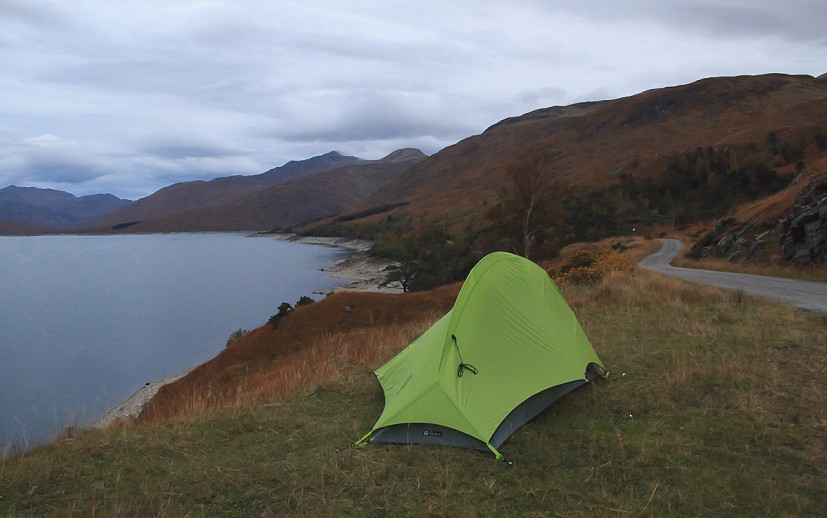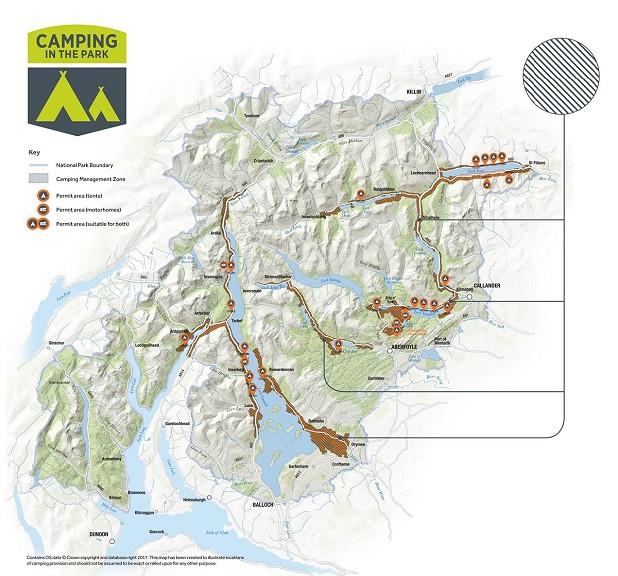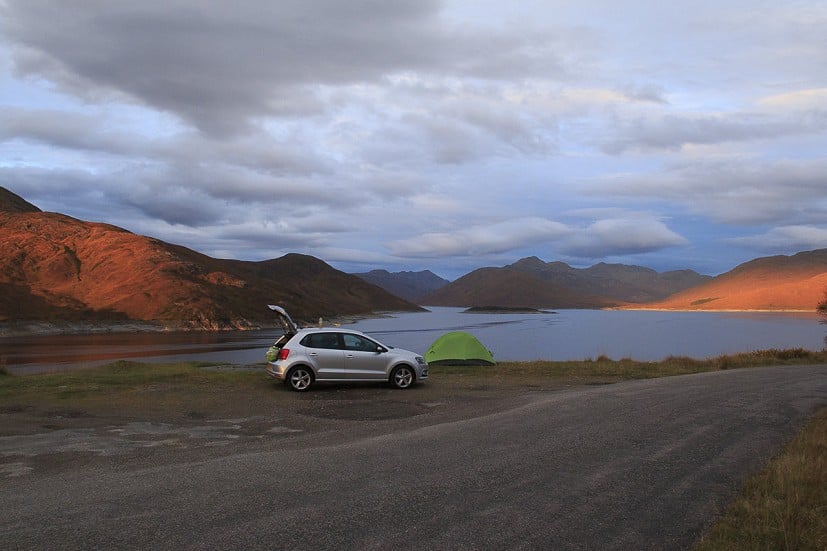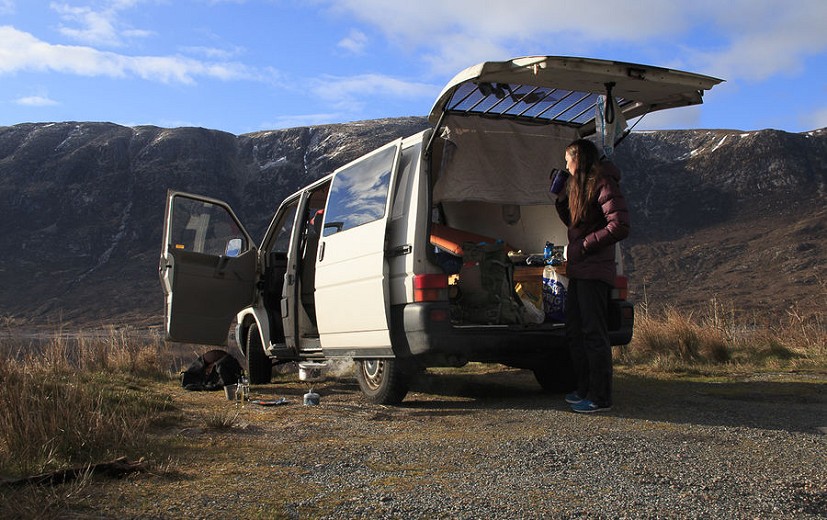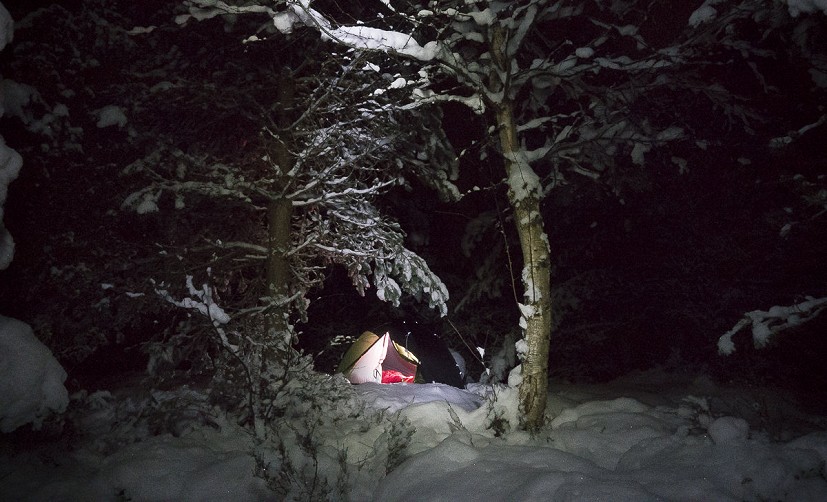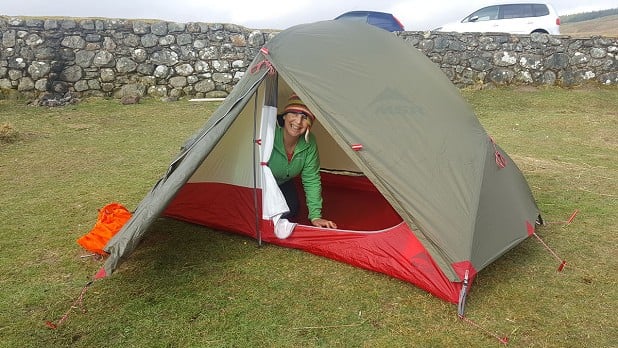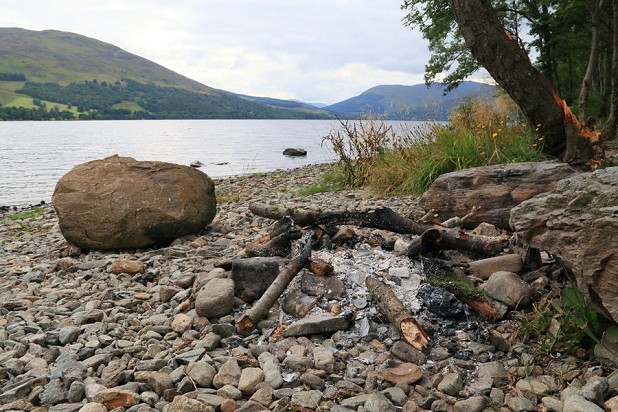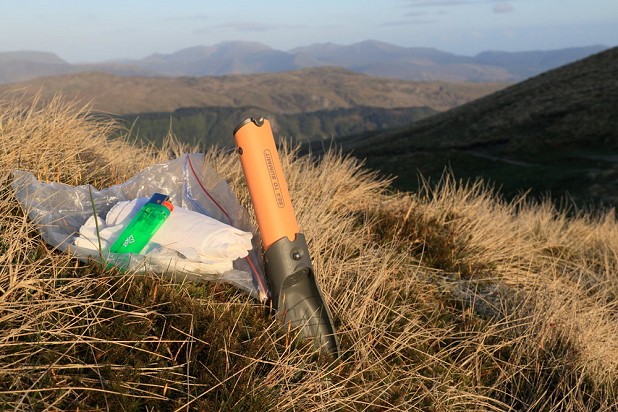The Dos and Don'ts of Roadside Camping
Camping by the road can be contentious, but it's the hooligans that give the rest of us a bad name. Many walkers still manage to enjoy the occasional roadside 'wild' camp, or night in a van, without spoiling the places we've come to see. Informal camping is free, after all, and often the default accommodation choice when faced with an early start on the hill and few nearby alternatives.
If we are to continue to enjoy this freedom then we need to camp with consideration. It is incumbent on each of us not to muck things up for the next person. That may boil down to nothing more than courtesy and common sense, but sadly these are qualities that some roadside campers and camper van owners seem to lack. So here are some basic dos and don'ts for minimising the impact next time you camp out of the car boot:
Know the law
The legal picture is best described as shades of grey, varying as it does across the nations of the UK. Before heading off for the weekend it's worth looking into the status quo at your chosen destination.
In England and Wales informal camping is legally iffy, and in most places it's probably safe to assume that you are technically on dodgy ground. Even on open access land there is no statutory right to wild camp. The legal small print is hard to spot from a hidden pitch way up in the hills, but setting up by the side of the road is clearly more liable to incur the wrath of farmers and landowners. If you must - and we would neither condemn nor condone it - then discretion is going to be key. Either that, or ask first.
Northern Ireland, meanwhile, has very few public rights of way and no legal framework for public access to open land. Walkers and climbers can access privately owned hill country only thanks to the goodwill and tolerance of landowners - something that tends to rule out camping anywhere visible.
In most of Scotland wild camping is a right - and this includes both camping out of the car boot and sleeping in your van in laybys. But with rights come responsibilities. Sadly some people seem unable to grasp this basic point, and in Loch Lomond and the Trossachs National Park, an area that takes the full brunt of weekend party campers, Scotland's liberal access regime has been called into question following the introduction of anti-camping rules. Seasonal byelaws have now rendered all roadside spots in the National Park effectively out of bounds for informal camping, and a permit system is in force backed up by ranger patrols and the threat of fines. For details see here
Arrive late and leave early
A multi-night base camp may be viable up in the hills (though arguably not best practise)... but on the verge of a busy A-road? In visible roadside locations, leaving a tent pitched for days on the trot is a no-no. Whether it annoys the locals or lays on an open invite to every opportunistic tent burgler, you're asking for trouble. Worse, it's just plain selfish. If every walker did likewise then we'd see tents festooned along all our mountain roads. If a prominent spot is your only option then the best way to avoid detection is to fly under the radar. If you delay pitching camp until around dusk, then pack up and get off early the next morning, the chances are that very few people will even have noticed your presence, let alone had time to object.
Park considerately
Is that a layby, or just a passing place? If you don't want to antagonise the farmer, or obstruct emergency vehicles, then it pays to know the difference. Single track roads and access tracks are easily blocked, so if you're trying to camp low-key then watch where you leave the wheels.
Try to stay out of sight
Nothing gives wild campers a bad name like being too blatant. Beside a minor road to nowhere it may not matter, but if you're parking your van or pitching a tent in a well frequented place then if possible try to get a bit away from the roadside. If you're only walking a couple of minutes from where you park then it probably still counts as car camping. Look for off-road parking places. Along some highland A-roads, for instance, short sections of the former course of the road double as laybys which can provide perfect spots to camp straight out of your car boot, while remaining practically invisible to passing traffic. Woods are good too, offering a screen behind which to camp unobtrusively.
Come in small groups
You'll be quieter, less noticeable, and ten people won't all go and pee behind the same bush. Obvious really.
Use small tents
You may be camping out of the boot, but still consider using a streamlined backpacking-sized tent rather than a lumbering family camping behemoth. Smaller tents are easier to pitch discreetly and generally less less in-your-face; they also take up a relatively compact footprint, giving you a lot more flexibility when it comes to selecting a place to pitch. You won't find many layby plots that just happen to be perfectly proportioned for a six-berth camping hotel with added awning and furniture; but postage stamp sized scraps of grass are ten a penny.
Leave no litter
Did it need saying? Sadly, yes: have you seen the state of the popular roadside camping spots?
Light no fires and cut no wood
For many people 'camp' just naturally seems to go with 'fire'. We've probably all had them. Fire is a communal bonding experience, a scratch for a primal pyromaniac itch - and, let's be honest, a lot of fun. The gathering of wood and its ritual immolation; strumming guitars and murdering songs; passing round drinks and toasting marshmallows; the warmth on your face and the cold at your back as you trance out on the flickering flames... It's hard to resist; but resist you should. If you don't have a fire then you will neither freeze nor be eaten by wolves. When camping in Britain, lighting up is an optional luxury - and at risk of being a killjoy it's a luxury, I'd argue, that we cannot collectively afford.
What's the big deal? Well the obvious concern is the risk of accidentally sparking a wildfire. Every year, dry weather in the hills is accompanied by fires that carbonise woods and lay waste to acres of moorland - many of them started, either deliberately or carelessly, by people lighting stuff they didn't ought to. Besides this worst case scenario, even the smaller local effects are wholly negative. In locations that suffer the pressure of numbers every available scrap of fallen timber is quickly hoovered up, leaving nothing for the insects and other mini beasts. That's not tidying the woods, it's habitat destruction. Worse soon follows when the fire-mad start stripping branches from living trees, even felling saplings. Has no one told these morons that green wood smokes worse than a black and white movie star? Hopefully you'd never do something so crass. But what about your fire ring - are you just going to leave it after you've finished? Well perhaps there was one already; there always is. You can spot a heavily used 'wild' camp site instantly - just look for the rings of blackened stones, the scorched turf and the heaps of ash. Britain is a small and busy place. If every camper had a fire then there'd soon be nowhere pristine left, just thousands of sad little charcoal circles. Since everyone can't do it, then the only sensible solution is for no-one to.
I can think of only two possible exceptions: an organised site, where provision for fires is made; or a beach below the tide line, where driftwood can be burnt and the post-fire evidence will soon be washed away.
Be fastidious with toileting
After a long night drive to Torridon, a camp close to the parking spot for tomorrow's big hill day was my only option. The headlights picked out a likely layby, and I soon had the tent up on the grassy verge. As I drifted off, I began to notice an odd aroma. Too late now. Only in the morning did the truth of my predicament dawn. I opened an eye, took a sniff, and sat bolt upright; I'd pitched on a poo - and a fresh human one too. Gingerly trying to pack the tent without actually touching anything; cleaning my hands with screenwash in lieu of soap; cursing the dirty bastard who'd been too lazy to walk a few minutes away from the verge... the horror.
When it comes to camping concerns, toilet waste is one of the most serious, and since roadside spots tend to see concentrated traffic the problem is particularly acute here. Laybys the length of Britain are scattered with turds and paper, and while anti social campers can't be blamed for it all, they certainly make their presence felt.
When nature calls, basic hygiene and consideration for your fellow humans should be uppermost in mind. Here are a few key rules of thumb: Get at least 30m from roads, car parks, paths and water sources. With a trowel, carefully cut out a square of turf. Once the deed is done, bury your excrement at least 15cm deep, replacing the turf on top. Pack out used toilet paper in a ziplock bag, or (very carefully) burn it, bearing in mind that whatever your intentions it's not very green to start a moorland fire by mistake (pour on water to douse the embers). Female sanitary products don't decompose and should always be taken home as litter... There may even be a case for packing out everything - and I mean everything. But that's a bridge most of us have yet to cross.
For more on this sticky subject see How to Poo Outdoors
Forget going lightweight
Minimalism is for backpacing. Car campers can afford a little luxury. You may only be pitching up from dusk til dawn, but that doesn't mean you necessarily have to neglect a few basic comforts. I'm thinking pillows, thick camping mats, extra bedding, bottles of wine, food that doesn't come dehydrated in a packet... You won't have far to carry it from the car, after all, so why not indulge a bit? Rules and lectures aside, camping is supposed to be fun.


